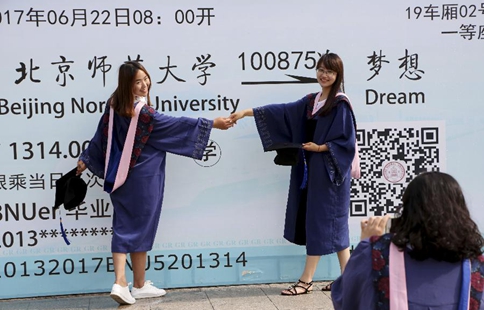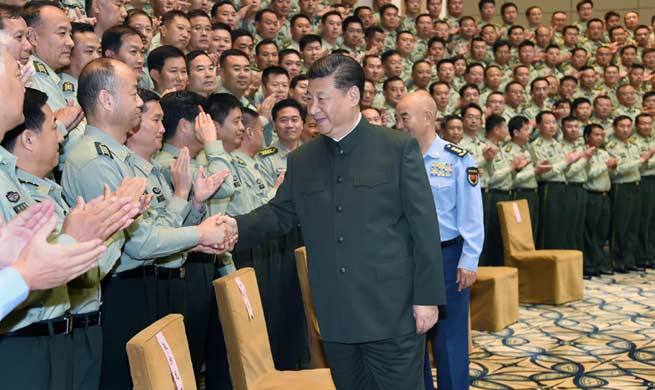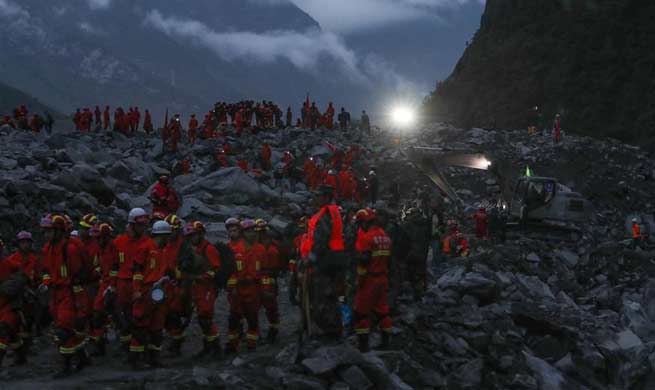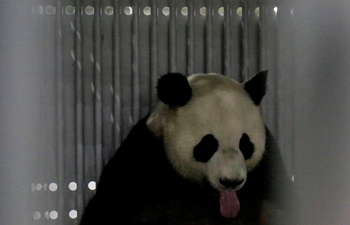by Gui Tao, Peter Barker
LONDON, June 25 (Xinhua) -- The private secretary of the former British Prime Minister Margaret Thatcher has said China has "behaved very responsibly" towards its commitments in the 1984 Sino-British Joint Declaration over the future of Hong Kong.
In a recent interview with Xinhua in London, Lord Charles Powell, the Private Secretary to Thatcher from 1983-1989, said the "one country, two systems" framework has been "remarkably good."
"It is a very elegant way to resolve a difficult question," said Powell, one of the architects of the Joint Declaration which decided the fate of the ex-British colony. "I continue to take a very positive view on Hong Kong."
In this key role, Powell had a ringside seat and a steering hand in the discussions around Hong Kong's future over three decades ago.
The Hong Kong Special Administrative Region (SAR) came into being in 1997 when the Chinese territory ceded to Britain in the 19th century was handed back to China after 99 years.
Powell hailed the Joint Declaration, where the Chinese government declared its basic policies regarding Hong Kong and the "one country, two systems" political framework, as "classic and exemplary."
"Overall it's been a positive experience," Powell said, "I think Hong Kong has been fortunate, and China has been fortunate -- so I don't have any regrets about what was agreed in 1984."
"There are constant rumors of Chinese interference but one sees very little," he added.
NEVER MEANT TO BE INDEPENDENT
Powell told Xinhua that some young Hong Kong people were ignorant of the history of the SAR, and did not know the details of the Joint Declaration.
"The younger generation in Hong Kong don't seem to remember or perhaps they never understood fully, what was agreed in 1984. Hong Kong was never going to be independent, it couldn't be independent," said Powell.
Discussions between China's former leader Deng Xiaoping and Thatcher had early on dealt with the issue of Hong Kong belonging to China.
"It was always recognized that sovereignty would be with China, and therefore China would have, obviously, a say in the way that the territory was run," Powell said.
The British side had always believed that Hong Kong was part of China, and the Joint Declaration was seen by Powell as a successful way of recognizing that fact, while also allowing it to retain some of the characteristics of structure and economy that had developed while it was under colonial rule.
"It is a long-term solution. We knew from the beginning Hong Kong was part of China. That was an inescapable fact. The young people now say they want independence and so on, they are talking rubbish because that was never envisaged, never provided for," said Powell, adding that the Chinese central government has given Hong Kong more democracy than the UK gave to the region.
Powell said that it would not be possible or legal for Hong Kong to be independent and politicians who called for this should not be able to stand for election.
"You could not have someone standing for election on a platform of making Hong Kong independent because that is simply not possible, it's not legal under the Basic Law or the Joint Declaration," said Powell.
A DIPLOMATIC CLASSIC
The signing of the Joint Declaration had followed a period of informal and formal discussions from the late 1970s onwards, said Powell, which had involved an exchange of views between the British and the Chinese sides.
The Joint Declaration eliminated the fears of the business community at that time, he added.
"It made them (fears) unnecessary. It set a way forward; so I still regard it a really classic piece of negotiation by both countries for which they deserve great credit," Powell said.
"I can't think of many other examples of that quality and importance of two countries coming together really resolving a very difficult problem in a cooperative way, despite the enormous differences between their political and economic systems," he said,"It's a monument to how to do business between countries facing seemingly intractable problems."
STABILITY AND GROWTH
Powell said that the recent chief executive election in Hong Kong that had seen Lam Cheng Yuet-ngor become the Hong Kong leader were good for the SAR.
Lam, 59, won the election of the fifth-term chief executive of the SAR in March, vowing to lead Hong Kong forward in solidarity.
"I think it (the election) produced a result which will enable Hong Kong to remain stable and its economy to continue to grow," said Powell.
He said the election could have had a more fruitful outcome for Hong Kong and for China had it not been for the opposition of so-called "'democratic' politicians."
"Now we all know the reasons for that. It was partly the way in which the Democrats in Hong Kong blocked the modest changes which should have been possible, was it two years ago three years ago in the way in which the election would be conducted," said Powell.
"And I think that is regrettable. It would have been to both sides' advantage, to China's advantage and to Hong Kong's," he added.

















